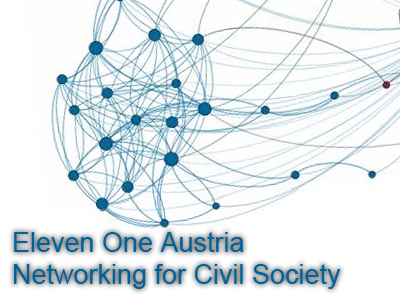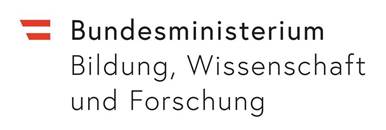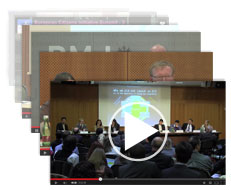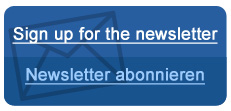Posts tagged ‘dialogue’
Visit the project website at ElevenOneAustria.eu!
The aim of the project Eleven One Austria is to conceptualize, develop and implement a pan-Austrian open access online platform for all official and other institutions as well as for all forms of organized civil society devoted to all areas of Union action for mutual exchange and exploitation of synergies. This would create a closed “European policy network” within which each participant has full knowledge of the activities of the other participants of the network.
The purpose of the Eleven One Austria network is to bring into live the long overdue Article 11 TEU para 1 to 3, i.e. the “horizontal and vertical European dialogue”. This adds to the public relations of Austria related to Europe and reduces Euroscepticism. An additional aspect of this network is to facilitate orientation for the competent European authorities when addressing questions to the institutions of civil society (e.g. Article 307 TFEU).
Participating partners include: Austrian Institute for European Law and Policy, University of Graz, University of Salzburg, State of Styria, State of Salzburg, Federal Chancellery of Austria.
Implementation
1. Test and adaption of FUTURIUM2 as an open technical platform and tool for policy making and dialogue
2. Dissemination of the tool to other interested clients in form of an open source, for open access
Outcome
The final outcome of the project Eleven One Austria is the first open access online tool for the Austrian civil society and their associations for a lively European discussion in the sense of collaborative and cooperative democracy. This will facilitate participation, co-design, co-planning, coediting as well as co-decision making. Austria will serve as a role model in the development of European Participatory Democracy that can be extended to other EU member states.
Visit the project website at ElevenOneAustria.eu!
Zur Projektseite mit Fotos der Veranstaltung
Am 10. und 11. Dezember 2014 präsentierte der Europäische Wirtschafts- und Sozialausschuss (EWSA) vor Jugendlichen an der Rechtswissenschaftlichen Fakultät der Universität Graz sein neues Pilotprojekt „My Europe…Tomorrow“, eine Online-Plattform, die mit der Unterstützung junger Menschen zukünftig den Europäischen Bürgerdialog fördern soll. Neben Spanien, Estland und Frankreich testen auch Jugendliche in Österreich die Plattform und sind aufgefordert, diese aktiv mitzugestalten, bevor der Startschuss von „My Europe…Tomorrow“ in ganz Europa fällt. Am Diskurs über die Wichtigkeit eines Europäischen zivilen Dialogs sowie über die technischen und inhaltlichen Anforderungen an die neue Online-Plattform beteiligten sich auch Österreich-Projektleiter Univ.-Prof. Dr. Johannes W. Pichler, die ehemalige Präsidentin des EWSA Dr. Anne-Marie Sigmund ebenso wie Vertreter von Wirtschafts- und Arbeiterkammer sowie Arbeitsmarktservice. Auch der amtierende EWSA Präsident Henri Malosse schaltete sich via Videokonferenz am gestrigen Veranstaltungstag zu und begrüßte das Engagement der österreichischen Jugendlichen bei der Entwicklung der Online-Plattform. Read more
In co-operation with the Bureau of European Policy Advisors (BEPA) and the Austrian Federal Chancellery, we organised a high-level seminar on engaging civil society and improving the dialogue between European institutions and civil society organisations.
The seminar was held on Monday, 24th June 2013 at the seat of the European Commission in the Berlaymont building in Brussels.
Documents:
Update: You can watch the video recordings of the conference here:
.
Since April 2012, a new instrument – the European citizens’ initiative (ECI) – has put EU citizens in the driving seat as it has provided them with an opportunity to directly shape the political future of the EU. The introduction of the ECI was one of the biggest successes for the Austrian Institute for European Law and Policy.
However, as matters sometimes turn out quite differently in practice from what was expected by the drafters, we have also seen a lot of problems and challenges. The first initiatives experienced problems with the registration process, the online collection software provided by the European Commission and missing financial ressources for campaigning.
In the light of those experiences, we teamed up with ECAS to organise a series of conferences in Brussels, Paris, Barcelona and Vienna to evaluate the first practical experiences with ECIs and their impact and to bring together experts, campaigners, researchers and decision makers from across Europe. While the conferences in Paris and Barcelona looked at legal issues and campaigning techniques, the Vienna conference organised by the Austrian Institute for Law and Policy looked at the technical aspects.
Based on the input from ECI organisers, scientists, campaigning experts and other stakeholders, we proposed several improvements to the European Citizens’ Initiative right (see our report below).
The conference we organised in Vienna in October 2012 was a huge success, bringing together nearly 150 participants, including several MEPs and high-ranking European Commission officials, representatives from nearly all European Citizens’ Initiatives and a sizeable number of interested public participants.
You can take a look at the report on the conference here.
.
.
Seit April 2012 haben europäische Bürger dank der Europäischen Bürgerinitiative (ECI) die Möglichkeit, die Agenda der EU mitzubestimmen. Die Einführung der ECI war einer der größten Erfolge für das Österreichische Institut für Europäische Rechtspolitik.
In der Praxis sind aber die ersten Initiativen leider auf größere, unerwartete Hürden gestoßen. Die ersten Initiativen hatten etwa mit Problemen bei der Registrierung ihrer Kampagnen, mit dem Onlinesystem der Europäischen Kommission zur Unterschriftensammlung und mit schlechter finanzieller Ausstattung zu kämpfen.
Vor dem Hintergrund dieser Erfahrungen haben wir mit ECAS zusammen eine Serie von Konferenzen in Brüssel, Paris, Barcelona und Wien organisiert, um die ersten praktischen Erfahrungen mit ECIs und deren Erfolg zu evaluieren und um Experten, Campaigner, Forscher und Entscheider aus ganz Europa zusammenzubringen. Die Konferenzen in Paris und Barcelona diskutierten rechtliche Aspekte und Campaigning-Techniken, und die vom Österreichischen Institut für Europäische Rechtspolitik organisierte Konferenz in Wien betrachtete die technischen Aspekte.
Basierend auf dem Input von ECI-Organisatoren, Forschern, Campaigning-Experten und anderen Stakeholdern schlugen wir eine Reihe von Verbesserungen für das Bürgerinitiativen-Recht vor (siehe unseren Bericht unten).
Die von uns organisierte Konferenz in Wien im Oktober 2012 war ein großer Erfolg und brachte fast 150 Teilnehmer, darunter mehrere Europaabgeordnete und hochrangige EU-Beamte, Vertreter fast aller Bürgerinitiativen und eine große Zahl an Interessenten nach Wien.
Der Abschlussbericht der Konferenz ist hier verfügbar.
In co-operation with CEPS and the Danube University Krems, we organised a series of high-level workshops, coupled with a study, on ways to improve the dialogue between European institutions, stakeholders and citizens. The research project sought to answer how affected stakeholders and interest groups can be better recognized and included in a constant and systematic dialogue with the EU. To answer those questions, we polled hundreds of different civil society groups and organised four workshops in Brussels in 2011 and 2012 with hundreds of participants.
External scientific input was provided by Piotr Maciej Kaczyński, Centre for European Policy Studies (Brussels), as well as by Dr. Klemens H. Fischer, Minister plenipotentiary at the Austrian Permanent Representation to the EU and adjunct Professor at the Institute for International and Foreign Politics at the University of Cologne, and Dr. Christine Leitner, Head of Center for European Public Administration (CEPA), Danube University, Krems.
The four workshops were organised on different subject areas and provided input by high-level professionals:
- 4th October 2011: Dialogue with the European Economic and Social Committee, with the Committee of Regions and Related Interest Groups
- 29th November 2011: Dialogue with Non-governmental and Religious / Philosophical Organisations
- 31st January 2012: Dialogue with non-organized Citizens
- 14th March 2012: Final Presentation
For more details and a list of speakers, please refer to the programme and for information on the methodology, please refer to the research notes.
In Zusammenarbeit mit dem CEPS und der Donau-Universität Krems organisierten wir eine Serie von high-level Workshops und eine Studie mit dem Ziel, den Dialog zwischen europäischen Institutionen, Stakeholdern und Bürgern zu verbessern. Ziel des Forschungsprojekts war es, Wege zu finden, wie Stakeholder und Interessengruppen besser erkannt und in einen konstanten und systematischen Dialog mit der EU eingebunden werden können. Um diese Fragen zu beantworte, befragten wir hunderte zivilgesellschaftliche Gruppen und organisierten 2011 und 2012 vier Workshops in Brüssel mit mehreren hundert Teilnehmern.
Wissenschaftlicher Input kam dabei unter anderem von Piotr Maciej Kaczyński, sowie von Dr. Klemens H. Fischer, Gesandter-Botschaftsrat bei der Ständigen Vertretung Österreichs bei der EU und Research Fellow am Institut für Internationale Politik und Außenpolitik der Universität zu Köln, und Dr. Christine Leitner, Leiterin des Center for European Public Administration (CEPA), Donau-Universität Krems.
Die vier Workshops behandelten unterschiedliche Themen und wurden von Referenten auf höchstem Niveau begleitet:
- 4. Oktober 2011: Dialog mit dem Wirtschafts- und Sozialausschuss der EU, mit dem Ausschuss der Regionen und Interessengruppen
- 29. November 2011: Dialog mit Non-governmental organisations und religiösen / pilosophischen Organisationen
- 31. Jänner 2012: Dialog mit nicht-organisierten Bürgern
- 14. März 2012: Abschlusspräsentation
Für weitere Details und eine Liste der Vortragenden, lesen Sie bitte das Programm und für Informationen zur Methodologie lesen Sie bitte die Research Notes.










